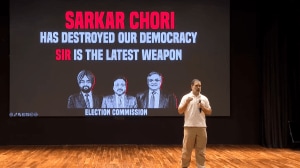Worker can’t seek promotion after keeping quiet for decade: SC
The court said an employee cannot remain silent for a decade and then cry foul over denial of promotion.

An employee cannot remain silent for a decade and then cry foul over denial of promotion, the Supreme Court has said while advising courts to reject delayed claims for equity in service matters.
The apex court said that granting relief in such cases would seriously jeopardise the chances and seniority of other employees who are in the reckoning in the normal course.
“The appellants slept over their rights which led to considerable delay of 11-12 years on the part of the appellants to give representation for promotion to the grade of UDC.
“A delay of 11-12 year cannot be overlooked when an applicant before the court seeks equity and specially in the case of service matters, as in the said case it jeopardises the existing positions of a very large number of members of that service,” a bench of Justices R V Raveendra and Mukundakam Sharma observed.
The bench passed the ruling while dismissing the appeal filed by Rajinder Pal Singh Lamba against the orders of a division bench of the Delhi High Court which had set aside a single judge’s order of granting promotion with retrospective effect to the appellant and another person with effect from January 1, 1976.
The single judge had granted the promotion with retrospective effect and other benefits despite the fact that the appellant had made a representation to the authorities for promotion about 12 years after the said promotion arose in the department.
In this case appellants Rajendra Singh Lamba and V K Garg were appointed lower division clerks (LDCs) on October 1 1972 and November 24 1969, respectively, in the ministerial establishment of the district and sessions judge, Delhi.
During their employment, Lamba and Garg completed their graduation from the Delhi University in the year 1975 and 1974, respectively.
Lamba gave an application on December 24 1986 and Garg gave an application on January 2 1987 to the district and sessions judge, Delhi, seeking promotion to the posts of upper division clerks (UDC) by invoking rule VI, Chapter 19-A of the High Court Rules and Order under the Punjab Courts Act, 1918.
The said rule mandated appointment of the ministerial staff to higher grade on the basis of the seniority from lower grades subject to the condition that they possessed the requisite educational qualifications.
But the appellants sought their promotions with effect from 1975 as according to them, permanent vacancies in the cadre of UDC had occurred in the year 1975.
The said application were rejected by the district and sessions judge following which they filed an administrative appeal before the Delhi High Court registrar who allowed their plea for promotion but ruled that the promotion would only be with prospective effect and not retrospective effect from 1975.
Aggrieved by the order the appellants filed a writ petition in the high court and a single judge ruled in their favour and also ordered that the benefit be accorded to other similarly-placed employees who completed their graduation before January 1976.
However, two persons Suraj Bhan and Radha Krishnan filed petitions before a division bench of the High Court challenging the ruling on the ground that no such representations should have been entertained as these were made after a lapse of 11 to 12 years.
They further submitted that rule VI, Chapter 19-A of the High Court Rules and order of the Punjab Courts Act, 1918 under which the retrospective promotions were ordered stood repealed by the subsequent enactment of the Government of India (Adaptation of Indian Law) Order 1937.
Agreeing with the view, a division bench of the high court held that the rule of promotion with retrospective effect involves the issue of seniority and the question cannot be re-opened after lapse of a considerable time.
During the pendency of the case, Lamba and Garg who were promoted to the post of UDC in the year 1988 were further promoted to the post of assistant in the case of Garg in 1995 and Lamba in 1997.
The appellants filed the appeal against the high court order before the apex court.
The apex court while rejecting their plea, however, said that in view of the fact that on the basis of the single judge’s order the appellants stood promoted 10 years ago, it would not be proper to take away the benefit at this stage.
“We do not think that it would be fair to the appellants if the benefit they had secured are taken away…Therefore, we direct that the benefits granted to the appellants and already received by them pursuant to the order of the Single Judge shall not be taken away as they have enjoyed such benefit for a very long period of time,” the bench said.
However, the bench said the appellants shall not be entitled to any additional benefit and the observations made by it should be considered only in the light of the peculiar facts and circumstances of the present case.



- 01
- 02
- 03
- 04
- 05




























